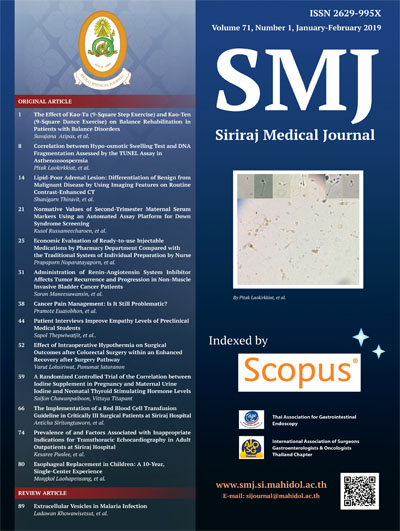Cancer Pain Management: Is It Still Problematic?
DOI:
https://doi.org/10.33192/Smj.2019.07Keywords:
Cancer pain; clinical response; pain management; predictive factorAbstract
Objective: To evaluate the efficacy of pain management during 3-month follow-ups for outpatients with cancer pain.
Methods: A retrospective chart review was conducted and included all newly diagnosed cancer pain patients
visiting the Siriraj Pain Clinic, Mahidol University, between January 2013 and June 2014. Demographic data, pain
intensity at first visit, 1-, 2- and 3-month follow-ups, pharmacological therapy and co-treatments were collected.
Good treatment response was defined as more than 30% pain reduction from baseline. Predictive factors associated
with pain treatment response were also assessed.
Results: Out of 432 new patients, 118 cancer pain patients were included in the study with a mean age of 59.8±13.7
years (range 18-91 years). About half of patients had at least one comorbidity. Over 90% of all cancer patients
presented with distance metastasis. Mixed neuropathic/nociceptive pain (53.4%) and nociceptive pain alone (43.2%)
were common pain features in cancer pain patients. The mean initial pain intensity described by verbal numerical
scales was 7.7±2.1 (range 3-10). The majority of patients (60.2%) received co-treatment. The main pharmacological
therapies in all patients were opioids (99.2%) and anticonvulsants (90.7%). At 3-month follow-up, nearly half of
patients achieved a good treatment response. However, 44.6% of good responders still had moderate and severe
pain. No predictive factors associated with the pain treatment response was found.
Conclusion: Approximately half of patients with cancer pain in the pain clinic achieved a good treatment response
whereas one-fifth of the patients had an increase in pain severity at their 3-month follow-up.
Downloads
Published
How to Cite
Issue
Section
License
Authors who publish with this journal agree to the following conditions:
Copyright Transfer
In submitting a manuscript, the authors acknowledge that the work will become the copyrighted property of Siriraj Medical Journal upon publication.
License
Articles are licensed under a Creative Commons Attribution-NonCommercial-NoDerivatives 4.0 International License (CC BY-NC-ND 4.0). This license allows for the sharing of the work for non-commercial purposes with proper attribution to the authors and the journal. However, it does not permit modifications or the creation of derivative works.
Sharing and Access
Authors are encouraged to share their article on their personal or institutional websites and through other non-commercial platforms. Doing so can increase readership and citations.















